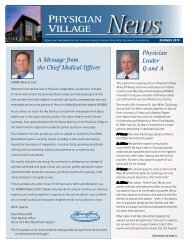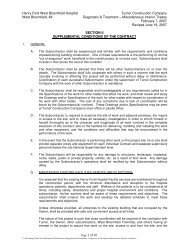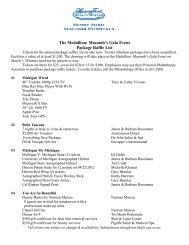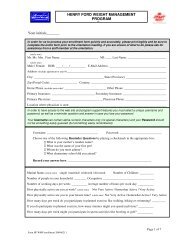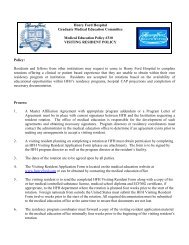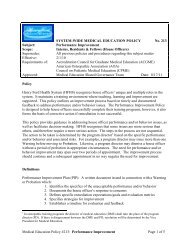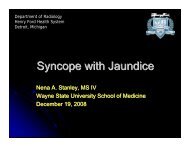Lean - Henry Ford Health System
Lean - Henry Ford Health System
Lean - Henry Ford Health System
- No tags were found...
Create successful ePaper yourself
Turn your PDF publications into a flip-book with our unique Google optimized e-Paper software.
Introduction to the<br />
<strong>Henry</strong> <strong>Ford</strong> Production <strong>System</strong><br />
Creating a Deming-LEAN Culture<br />
LEAN Training 2010<br />
<strong>Ford</strong> Motor Company's River Rouge Plant, 1931<br />
in <strong>Health</strong>care<br />
QuickTime and a<br />
decompressor<br />
are needed to see this picture.<br />
“Quality is doing it right when no one is looking."<br />
-<strong>Henry</strong> <strong>Ford</strong><br />
Richard J. Zarbo, MD, DMD<br />
Pathology and Laboratory Medicine<br />
<strong>Henry</strong> <strong>Ford</strong> <strong>Health</strong> <strong>System</strong>, Detroit<br />
<strong>Henry</strong> <strong>Ford</strong> Production <strong>System</strong>
LEAN<br />
LEAN Training 2010<br />
What is it?<br />
<strong>Henry</strong> <strong>Ford</strong> Production <strong>System</strong>
We<br />
LEAN Training 2010<br />
<strong>Lean</strong>?<br />
did<br />
<strong>Lean</strong>!<br />
<strong>Henry</strong> <strong>Ford</strong> Production <strong>System</strong>
<strong>Lean</strong> =<br />
LEAN Training 2010<br />
Deming<br />
(perfected by)<br />
<strong>Henry</strong> <strong>Ford</strong> Production <strong>System</strong>
LEAN<br />
Toyota’s Unique<br />
Mass Production Processes<br />
Decoding the DNA<br />
of the<br />
Toyota Production<br />
<strong>System</strong><br />
LEAN Training 2010<br />
1978<br />
1991<br />
Steven J. Spear & H.<br />
Kent Bowen<br />
2003<br />
2003<br />
2004<br />
1925 1982<br />
<strong>Henry</strong> <strong>Henry</strong> <strong>Ford</strong> <strong>Ford</strong> Production <strong>System</strong>
Basics of LEAN<br />
Basics of LEAN<br />
Specify Value Desired by Customer<br />
• Identify value stream & challenge all wasted steps<br />
• Manage towards perfection (zero defects)<br />
LEAN Training 2010<br />
Reduce & Eliminate Waste, Continually<br />
• Overproduction<br />
• Time waiting<br />
• Transportation<br />
• Processing<br />
• Stock on hand<br />
• Movement<br />
• Defective products<br />
Process Focused<br />
Incremental Improvements<br />
Specific Ideals, Rules,<br />
Operational Principles<br />
<strong>Henry</strong> <strong>Ford</strong> Production <strong>System</strong>
Toyota<br />
PROCESS FOCUSED<br />
Methods for<br />
Eliminating Waste<br />
LEAN Training 2010<br />
• Just-in-time production<br />
Leveled production, allocate work evenly<br />
throughout day<br />
Pull system, link each process to preceding &<br />
following<br />
Continuous flow processing, reduce batch sizes<br />
Eliminating inventories<br />
Multi-skilled operators<br />
Employees in charge of own jobs<br />
Employees design standardized work<br />
Continuous improvements (kaizen)<br />
<strong>Henry</strong> <strong>Ford</strong> Production <strong>System</strong>
Why LEAN management?<br />
LEAN Training 2010<br />
• Identify & addresses system problems<br />
• Identify & resolve bottlenecks to throughput<br />
• Create a learning organization and culture<br />
• Develop people<br />
• Active participation of all staff<br />
• Create ownership for problem resolution<br />
• Continually improve quality, meet customer needs<br />
• Move incrementally to the ideal, continuously<br />
Zero Defect Tolerance<br />
Zero Defect Tolerance<br />
Zarbo RJ, D’Angelo R. Transforming to a quality culture: the<br />
<strong>Henry</strong> <strong>Ford</strong> Production <strong>System</strong>. Am J Clin Pathol.<br />
2006;126(suppl):S21-S29.<br />
<strong>Henry</strong> <strong>Ford</strong> Production <strong>System</strong>
LEAN Training 2010<br />
“It’s the work,<br />
Not the man that manages.”<br />
-<strong>Henry</strong> <strong>Ford</strong><br />
<strong>Henry</strong> <strong>Ford</strong> Production <strong>System</strong>
4 Rules of Work Design<br />
4 Rules of Work Design<br />
Decoding the DNA of the Toyota Production<br />
<strong>System</strong>. Spear & Bowen<br />
Harvard Bus Rev Sept-Oct 1999<br />
LEAN Training 2010<br />
• Rule 1- STANDARD ACTIVITIES<br />
• Specifications document all work processes to include<br />
content, sequence, timing, location & expected<br />
outcome (how do you do your work)<br />
• Rule 2- STANDARD CONNECTIONS<br />
• Connections with clear YES/NO signals directly link<br />
every customer & supplier (requests & responses)<br />
• Rule 3- STANDARD PATHWAYS<br />
• Every product & service travels a predefined, single,<br />
simple & direct flow path (no looping or forking)<br />
• Rule 4- IMPROVEMENT & WORKER EMPOWERMENT<br />
• Workers at level where work is done, guided by a<br />
teacher, improve their own work, using data<br />
STANDARDIZATION<br />
REDUCE VARIATION<br />
<strong>Henry</strong> <strong>Ford</strong> Production <strong>System</strong>
LEAN Tools to Improve Workflow<br />
LEAN Tools to Improve Workflow<br />
LEAN Training 2010<br />
• Standard work<br />
• Mistake proofing<br />
• Batch size reduction<br />
• Level load<br />
• Work simplification<br />
• Visual displays, controls & and color coding<br />
• Andon white boards<br />
• Kanban<br />
• Stop the line<br />
Liker: The Toyota Way, 2006<br />
<strong>Henry</strong> <strong>Ford</strong> Production <strong>System</strong>
Medical “Business” Processes<br />
Medical “Business” Processes<br />
LEAN Training 2010<br />
Raw material<br />
Processing<br />
Technology<br />
Product<br />
Medicine/Surgery, Outpatient clinic, Lab, Radiology, Kitchen, etc<br />
Humans<br />
Generic Manufacturing Industry<br />
PROCESSES<br />
Processes<br />
•Evaluation<br />
•Admission<br />
•Assessment<br />
•Testing<br />
•Treatment<br />
•Discharge<br />
<strong>Health</strong> Outcomes<br />
•Productivity<br />
•Defects, Cost<br />
•Process stability<br />
•Employee satisfaction<br />
•Patient satisfaction<br />
<strong>Henry</strong> <strong>Ford</strong> Production <strong>System</strong>
LEAN Training 2010<br />
<strong>Henry</strong> <strong>Ford</strong> Production <strong>System</strong>
Current Work Condition<br />
Current Work Condition<br />
LEAN Training 2010<br />
Top down management- threatening<br />
No workflow leveling- uncoordinated batches<br />
Hiding defects- fear & blame<br />
Lack of of communication<br />
No worker empowerment to to fix<br />
Worker creativity in in bad system<br />
Defects … Defects…<br />
<strong>Henry</strong> <strong>Ford</strong> Production <strong>System</strong>
Original <strong>Ford</strong><br />
LEAN Training 2010<br />
Production<br />
<strong>System</strong><br />
<strong>Henry</strong> <strong>Ford</strong> Production <strong>System</strong>
standardization<br />
coordination<br />
waste<br />
cleanliness<br />
just-in-time inventory<br />
Pull production<br />
one at a time production<br />
empowered workforce<br />
timing<br />
1925<br />
LEAN Training 2010<br />
cycle time<br />
moving assembly line<br />
Foundations of LEAN 1986<br />
Quality focus<br />
Quality control<br />
measurement<br />
value of worker<br />
Continuous improvement<br />
Long term plan<br />
1986<br />
Kanban system<br />
continuous flow<br />
rapid changeover<br />
error proof machines<br />
1978<br />
1988<br />
<strong>Henry</strong> <strong>Ford</strong> Production <strong>System</strong>
Creating a Mass Production Culture<br />
LEAN Training 2010<br />
“It’s the work, not the man, that manages “<br />
<strong>Henry</strong> <strong>Ford</strong> Production <strong>System</strong>
Mass Production - Continuous Operation<br />
Sat.<br />
night<br />
LEAN Training 2010<br />
3 ½<br />
days<br />
Wed.<br />
noon<br />
From: The <strong>Ford</strong> Industries. <strong>Ford</strong> Motor Co., 1925<br />
<strong>Henry</strong> <strong>Ford</strong> Production <strong>System</strong>
Mass Production<br />
Mass Production<br />
•Continuous<br />
Production<br />
•Conveyor belt<br />
assembly line<br />
LEAN Training 2010<br />
•Division of<br />
labor<br />
•Simple<br />
repetitive tasks<br />
•Integrated<br />
supply chain<br />
•Standardized<br />
parts<br />
•Reducing<br />
waste<br />
<strong>Henry</strong> <strong>Ford</strong> Production <strong>System</strong>
Our Roots: <strong>Henry</strong> <strong>Ford</strong> Hospital<br />
• Founded October 1, 1915<br />
By <strong>Henry</strong> <strong>Ford</strong> as sole owner & president<br />
Wife, Clara’s honey-do list<br />
Employed staff model after dinner with Mayo brothers<br />
LEAN Training 2010<br />
Standardization<br />
“It seems reasonable that a permanent staff<br />
be responsible for the work that goes on in the<br />
hospital. After all, I don’t ask every person who<br />
wants to build a car to come into my factory to build it.<br />
The <strong>Ford</strong> Motor Company is responsible for the car it makes.<br />
Why should not the hospital be responsible for the<br />
medical work that is done there?”<br />
– <strong>Henry</strong> <strong>Ford</strong><br />
<strong>Henry</strong> <strong>Ford</strong> Production <strong>System</strong>
Production <strong>System</strong> Characteristics<br />
Triumph of the <strong>Lean</strong> Production <strong>System</strong>, Sloan Management Review 1988<br />
Trait Craftsmen Pure <strong>Ford</strong>ism Recent <strong>Ford</strong>ism TPS<br />
Work<br />
Standardization Low High, by managers High, by managers High, by teams<br />
LEAN Training 2010<br />
Span of Control Wide Narrow Narrow Moderate<br />
Inventories Large Moderate Large Small<br />
Buffers Large Small Large Small<br />
Repair Areas Integral Small Large Very Small<br />
Teamwork Moderate Low Low High<br />
“Rather than continuing to refer to the different paradigms as recent <strong>Ford</strong>ism<br />
And TPS, I would like to introduce two new terms herebuffered<br />
and lean production systems.”<br />
- John Krafcik (1988)<br />
<strong>Henry</strong> <strong>Ford</strong> Production <strong>System</strong>
LEAN<br />
QUALITY<br />
LEAN Training 2010<br />
It’s the Culture,<br />
Stupid!<br />
<strong>Henry</strong> <strong>Ford</strong> Production <strong>System</strong>
Total Quality Management<br />
Total Quality Management<br />
LEAN Training 2010<br />
• We’ve been here before- circa 1989<br />
• “A culture, attitude & organization that<br />
strives to provide customers with products<br />
and services that satisfy needs”<br />
• Quality Improvement using PDCA<br />
Scientific basis: Plan, Do, Check, Act<br />
• Deming principles<br />
• Failed because we didn’t change our<br />
culture<br />
<strong>Henry</strong> <strong>Ford</strong> Production <strong>System</strong>
Leaders Transform Culture<br />
Leaders Transform Culture<br />
“Culture eats strategy for breakfast & process for lunch”<br />
LEAN Training 2010<br />
Culture = How people have been conditioned to behave<br />
“The only things that evolve by themselves in an<br />
organization are disorder, friction, and malperformance.”<br />
-Peter Drucker<br />
<strong>Henry</strong> <strong>Ford</strong> Production <strong>System</strong>
Changing Culture<br />
It Starts & Ends with YOU<br />
LEAN Training 2010<br />
“Western management must take on leadership for change.”<br />
“Adopt the new culture”<br />
-W. Edwards Deming<br />
<strong>Henry</strong> <strong>Ford</strong> Production <strong>System</strong>
Deming Culture<br />
Deming’s Redefinition of Management<br />
LEAN Training 2010<br />
“In companies that have embraced Deming’s vision,<br />
management’s job is to ‘work on the system’<br />
to achieve continual product and process improvement.<br />
The Deming-style manager must-<br />
‣ensure a system’s consistency and reliability, by bringing<br />
‣level of variation in its operations within predictable limits, then by<br />
‣enlisting the participation of every employee, and by<br />
‣giving subordinates the practical benefit of his experience<br />
and the help they need to chart improvement strategies.”<br />
(A. Gabor)<br />
<strong>Henry</strong> <strong>Ford</strong> Production <strong>System</strong>
<strong>Henry</strong> <strong>Ford</strong><br />
LEAN Training 2010<br />
Production<br />
<strong>System</strong><br />
<strong>Henry</strong> <strong>Ford</strong> Production <strong>System</strong>
Hub & Spoke Design - Pathology & Laboratory Medicine<br />
HF-MAC<br />
LEAN Training 2010<br />
HF-WBH<br />
24/7<br />
24/7<br />
HF-KG<br />
HF-WH<br />
24/7<br />
HFH<br />
HF-MWAR<br />
HF-COT<br />
Hospital<br />
24 Hr. Med Center<br />
Medical Clinic<br />
24/7<br />
<strong>Henry</strong> <strong>Ford</strong> Production <strong>System</strong>
Creating Culture<br />
LEAN Training 2010<br />
Transforming to a Quality<br />
Culture<br />
The <strong>Henry</strong> <strong>Ford</strong> Production <strong>System</strong><br />
Richard J Zarbo, MD, DMD, and Rita D’Angelo, MS, ASQ, CQE,<br />
SSBB<br />
American Journal of Clinical Pathology<br />
2006;126:Suppl S21-S29.<br />
BCBSM Foundation 2008 McDevitt Excellence in Research Award<br />
for Policy Research- the ‘<strong>Henry</strong> <strong>Ford</strong> Production <strong>System</strong>’<br />
<strong>Henry</strong> <strong>Ford</strong> Production <strong>System</strong>
Constancy of Purpose<br />
LEAN Training 2010<br />
“Obstacles are those frightful things you see<br />
when you take your eyes off your goal.”<br />
-<strong>Henry</strong> <strong>Ford</strong><br />
<strong>Henry</strong> <strong>Ford</strong> Production <strong>System</strong>
The Business Case for Quality<br />
Customer Satisfaction<br />
Market Share<br />
LEAN Training 2010<br />
Quality<br />
External<br />
Internal<br />
Productivity<br />
Prices<br />
Costs<br />
Profits<br />
Deming’s Quality Chain Reaction<br />
<strong>Henry</strong> <strong>Ford</strong> Production <strong>System</strong>
<strong>Henry</strong> <strong>Ford</strong> LEAN Lab Progression<br />
FAIL<br />
LEAN Specialist, Coordinators<br />
Surgical Pathology<br />
2-day LEAN<br />
Training<br />
-Biobehavioral<br />
-HFH Surgery<br />
-HF Transplant<br />
LEAN Training 2010<br />
2004 2005<br />
2006 2007 2008<br />
Onsite Mandatory<br />
8 hr. Training<br />
Programs<br />
Cytology<br />
2009<br />
Clinical Pathology Core Labs<br />
Chemistry-Hematology-Coag-Urinalysis<br />
Microbiology<br />
Medical Centers<br />
5 Community<br />
Hospitals<br />
Outreach<br />
<strong>Henry</strong> <strong>Ford</strong> Production <strong>System</strong>
Problem Solving Culture<br />
LEAN Training 2010<br />
It takes systems to integrate <strong>System</strong>s<br />
<strong>Henry</strong> <strong>Ford</strong> Production <strong>System</strong>
The Power of Integrated Teams<br />
Aligned Path of Work Flow<br />
LEAN Training 2010<br />
“<strong>System</strong>s do not produce quality,<br />
people do.”<br />
-anonymous<br />
<strong>Henry</strong> <strong>Ford</strong> Production <strong>System</strong>
Lab <strong>Lean</strong> Journey 2004-2010<br />
LEAN Training 2010<br />
• Cultural change to an empowered workforce<br />
• Quality-focused Mission, Vision, Values, Org. Structure<br />
• Deming management & Toyota (LEAN) work rules<br />
• Visible, blameless identification of defects by workers<br />
• PDCA (A3) based solutions at the level of the worker<br />
• Fix defects in ‘real time’<br />
• Over 700 trained employees- all <strong>System</strong> lab sites<br />
• Quality coordinators, Defined Work Teams, Customer-<br />
Supplier meetings, Monthly ‘Share the Gain’ presentations<br />
• Expectation 1 improvement/ team / month<br />
• 100s of improvements made each year by autonomous<br />
work cells (536 done in 2009 at HFH alone)<br />
<strong>Henry</strong> <strong>Ford</strong> Production <strong>System</strong>
Standardization<br />
-Work Rules-<br />
LEAN Training 2010<br />
“Today’s standardization, instead of<br />
being a barricade against improvement,<br />
is the necessary foundation on which<br />
tomorrow’s improvement will be based.”<br />
– <strong>Henry</strong> <strong>Ford</strong><br />
1. Activities<br />
2. Connections<br />
3. Pathways<br />
4. Method of Improvement<br />
<strong>Henry</strong> <strong>Ford</strong> Production <strong>System</strong>
LEAN Culture of Continual Improvement<br />
PROCESS FOCUSED<br />
Methods for Eliminating Waste, Continually<br />
LEAN Training 2010<br />
• Process Defects & Waste- the Twin Problems<br />
• Continuous, Smooth Flow, Just-in-Time- the Work Redesign<br />
• Standard Work & the Customer-Supplier Loop- the Solution<br />
• Empowered Personnel, Correcting One’s Own Errors,<br />
Creating Standard Work- the Problem Solvers<br />
• Presentations- the Motivators<br />
• Meetings- the Leadership Reinforcer<br />
• Visual Cues, Easy to See Quality- the Helpers<br />
• Technology reinforcing work rules & standards- the Enablers<br />
• Teamwork-hundreds of process improvements- the Results<br />
<strong>Henry</strong> <strong>Ford</strong> Production <strong>System</strong>
The <strong>Henry</strong> <strong>Ford</strong> Production <strong>System</strong><br />
Effective Reduction of Process Defects and<br />
Waste in Surgical Pathology<br />
Richard J Zarbo and Rita D’Angelo AJCP 2007;128:1015-1022.<br />
The <strong>Henry</strong> <strong>Ford</strong> Production <strong>System</strong><br />
Measures of Process Defects and Waste<br />
in Surgical Pathology as a Basis for Quality<br />
Improvement Initiatives<br />
Rita D’Angelo and Richard J Zarbo AJCP 2007;128:423-429.<br />
LEAN Training 2010<br />
“We do nothing at all in what is sometimes<br />
ambitiously called research, excepting as it<br />
relates to our single objective.”<br />
The <strong>Henry</strong> <strong>Ford</strong> Production <strong>System</strong><br />
Reduction of Surgical Pathology In-Process<br />
Misidentification Defects by Bar Code Specified<br />
Work Process Standardization<br />
Richard J. Zarbo, J. Mark Tuthill, Rita D’Angelo, Ruan Varney,<br />
Beverly Mahar,Cheryl Neuman, and Adrian Ormsby<br />
AJCP 2009;131:468-477<br />
-<strong>Henry</strong> <strong>Ford</strong><br />
The <strong>Henry</strong> <strong>Ford</strong> Production <strong>System</strong><br />
LEAN Process Redesign Improves Service in<br />
the Molecular Diagnostic Laboratory<br />
Cankovic M, Varney R, Whitely L, Brown R, D'Angelo R,<br />
Chitale D, Zarbo RJ:<br />
J Mol Diagn 11:390–399, 2009.<br />
<strong>Henry</strong> <strong>Ford</strong> Production <strong>System</strong>
As leader,<br />
I don’t have all the answers<br />
LEAN Training 2010<br />
“Doing your best is not good enough.<br />
You have to know what to do.<br />
Then do your best.”<br />
-W. E. Deming<br />
<strong>Henry</strong> <strong>Ford</strong> Production <strong>System</strong>
LEAN Training 2010<br />
Rx<br />
FULL<br />
DEMING<br />
PRESCRIPTION<br />
or<br />
Half-dose ?<br />
<strong>Henry</strong> <strong>Ford</strong> Production <strong>System</strong>
Why empower the worker?<br />
LEAN Training 2010<br />
Executive Leader<br />
Supervisor/Manager<br />
Ultimate Solutions<br />
Depend on<br />
View<br />
of the<br />
Problems<br />
“There are no big problems, there are just a lot of little problems.” -<strong>Henry</strong> <strong>Ford</strong><br />
Line Worker<br />
<strong>Henry</strong> <strong>Ford</strong> Production <strong>System</strong>
Empowerment<br />
LEAN Training 2010<br />
“Most doctors prescribe pills,<br />
I prescribe empowerment”<br />
–Jay Parkinson, MD<br />
<strong>Henry</strong> <strong>Ford</strong> Production <strong>System</strong>
<strong>Lean</strong><br />
LEAN Training 2010<br />
Right<br />
Light<br />
Empowered Workers<br />
Transformed Culture<br />
Continuous bottom up<br />
Management Style<br />
Sporadic Kaizen Events<br />
Management Style<br />
Direct Top-down Projects<br />
Concepts & Tools<br />
Partial Adoption<br />
Passing Fad<br />
“Let’s Outlast This Thing”<br />
SUCCESS<br />
Degree of<br />
effort<br />
<strong>Henry</strong> <strong>Ford</strong> Production <strong>System</strong>
Redefine the Expectation of ‘Work”<br />
LEAN Training 2010<br />
“It’s the work,<br />
Not the man that manages.”<br />
-<strong>Henry</strong> <strong>Ford</strong><br />
<strong>Henry</strong> <strong>Ford</strong> Production <strong>System</strong>
The Engaged Worker<br />
The Engaged Worker<br />
Transform approach to work<br />
Not just showing up for work, but arriving to do the<br />
work better<br />
LEAN Training 2010<br />
Culture<br />
Empowered workers who see their daily<br />
work in the context of-<br />
-Continually learning<br />
-Constantly communicating<br />
-Making effective process improvements<br />
-Designed and tested by scientific method<br />
<strong>Henry</strong> <strong>Ford</strong> Production <strong>System</strong>
Never Pass a Defect<br />
The ‘Mantra’<br />
LEAN Training 2010<br />
“Quality is doing it right when no one is looking."<br />
-<strong>Henry</strong> <strong>Ford</strong><br />
<strong>Henry</strong> <strong>Ford</strong> Production <strong>System</strong>
Worker Empowerment<br />
Worker Empowerment<br />
LEAN Training 2010<br />
“The suggestions are supposed<br />
to go in the box.”<br />
“Has knowledge,<br />
skills, authority &<br />
desire to decide and<br />
act within<br />
prescribed limits.<br />
Takes responsibility<br />
for the consequences<br />
of their actions &<br />
for contribution to<br />
the success of the<br />
enterprise.”<br />
-JM Juran<br />
<strong>Henry</strong> <strong>Ford</strong> Production <strong>System</strong>
LEAN Training 2010<br />
Teamwork<br />
“There are no big problems,<br />
there are just a lot of little problems.”<br />
-<strong>Henry</strong> <strong>Ford</strong><br />
<strong>Henry</strong> <strong>Ford</strong> Production <strong>System</strong>
LEAN Team<br />
LEAN Team<br />
“Creativity prospers best under particular conditions,<br />
especially where there is a flow of ideas between<br />
people who have different sorts of expertise.”<br />
-Ken Robinson<br />
LEAN = Team success<br />
LEAN Training 2010<br />
Depend on the TEAM<br />
Admit you don’t have all the answers<br />
Mine the creativity of the group<br />
Dysfunctional Team?<br />
= LEAN failure<br />
<strong>Henry</strong> <strong>Ford</strong> Production <strong>System</strong>
Teamwork<br />
You may lead it……<br />
But it’s ALL about them<br />
“The day you become a leader,<br />
It becomes about them.”<br />
-Jack Welch<br />
Now empower them!<br />
<strong>Henry</strong> <strong>Ford</strong> Production <strong>System</strong>
“Present” to “Future” Culture<br />
“Renters”<br />
“Owners”<br />
LEAN Training 2010<br />
-Develop a culture that leads, manages and drives<br />
patient safety & quality everyday<br />
-Engage entire workforce<br />
-Accountability for seeking ‘perfect’ work<br />
<strong>Henry</strong> <strong>Ford</strong> Production <strong>System</strong>
Expose Defects<br />
LEAN Training 2010<br />
“Even a mistake may turn out to be the one<br />
thing necessary to a worthwhile<br />
achievement.”<br />
-<strong>Henry</strong> <strong>Ford</strong><br />
<strong>Henry</strong> <strong>Ford</strong> Production <strong>System</strong>
Blameless<br />
“Don’t find fault, find a remedy;<br />
anybody can complain.”<br />
-<strong>Henry</strong> <strong>Ford</strong><br />
LEAN Training 2010<br />
“On the internet, nobody knows you’re a dog.”<br />
<strong>Henry</strong> <strong>Ford</strong> Production <strong>System</strong>
What is a defect?<br />
What is a defect?<br />
LEAN Training 2010<br />
Poor quality of service or product that makes you:<br />
• Stop your work<br />
• Reject it<br />
• Return it to sender<br />
• Delay your work to fix it yourself<br />
• Not pleased, could be better<br />
Measures of Variation<br />
Error = hurts someone<br />
= WASTE<br />
= REWORK<br />
<strong>Henry</strong> <strong>Ford</strong> Production <strong>System</strong>
Customer Feedback Informing Improvements<br />
Feedback to Suppliers<br />
Customer Feedback<br />
LEAN Training 2010<br />
Suppliers<br />
LEAN culture<br />
Your Processes<br />
In-process<br />
feedback<br />
LEAN culture<br />
Customers<br />
-Radicalogic, incidents<br />
-Customer satisfaction surveys<br />
-Customer complaints<br />
-Press-Ganey surveys<br />
-Focus groups<br />
<strong>Henry</strong> <strong>Ford</strong> Production <strong>System</strong>
Understanding<br />
LEAN Training 2010<br />
&<br />
Minimizing<br />
VARIATION<br />
<strong>Henry</strong> <strong>Ford</strong> Production <strong>System</strong>
LEAN Training 2010<br />
Data Collection<br />
Data Collection<br />
Dry-Erase<br />
Posters<br />
“Data is of course important in manufacturing,<br />
but I place the greatest emphasis on facts.”<br />
-Taiichi Ohno<br />
If you cant measure it…<br />
Surgical<br />
Number/ Part<br />
A, B, C, D<br />
Entered Part Type Correct Part Type Source of Incorrect Part<br />
Information<br />
White Boards<br />
<strong>Henry</strong> <strong>Ford</strong> Production <strong>System</strong>
Defect Board- Make Defects & Resolution Visible<br />
LEAN Training 2010<br />
• Histology Core lab<br />
• Lab meets weekly to<br />
review past week’s<br />
defects<br />
• Defects are posted on<br />
white board with<br />
resolution for all to see<br />
and learn from<br />
<strong>Henry</strong> <strong>Ford</strong> Production <strong>System</strong>
Minimizing Variation<br />
<strong>Henry</strong> <strong>Ford</strong> Production <strong>System</strong> Methodology<br />
LEAN Training 2010<br />
1. Know performance expectations from your system of work<br />
2. Expect regularly collected measures of key work<br />
performance in each work cell, leader and worker driven<br />
3. Make performance deviations visible, blameless, daily<br />
4. Understand magnitude and causes of that variation<br />
5. Survey internal and external customers-suppliers for<br />
sources defects (dissatisfaction, patient safety concerns)<br />
6. Use whiteboards in workplace to identify daily defects<br />
1. Lack of, or deviation from standard work<br />
2. Lack of, or deviation from standard connection<br />
3. Lack of, or deviation from standard pathway<br />
4. 7 types of waste that can be redesigned OUT<br />
<strong>Henry</strong> <strong>Ford</strong> Production <strong>System</strong>
As Leader,<br />
LEAN Training 2010<br />
this is your<br />
JOB #1<br />
<strong>Henry</strong> <strong>Ford</strong> Production <strong>System</strong>
Coming Full Circle<br />
1926 to Present<br />
LEAN Training 2010<br />
"Our system of management is not a system at all;<br />
it consists of planning the methods of doing the work<br />
as well as the work."<br />
-<strong>Henry</strong> <strong>Ford</strong><br />
<strong>Henry</strong> <strong>Ford</strong> Production <strong>System</strong>
Roles of the<br />
LEAN Training 2010<br />
‣GROUP LEADER<br />
‣TEAM LEADER<br />
‣TEAM MEMBER<br />
‣FACILITATOR<br />
<strong>Henry</strong> <strong>Ford</strong> Production <strong>System</strong>
Leading<br />
LEAN Training 2010<br />
CHANGE<br />
<strong>Henry</strong> <strong>Ford</strong> Production <strong>System</strong>
Implementing Successful Change<br />
LEAN Training 2010<br />
“The effort is usually a time consuming and highly complex 8-step process,<br />
never a 1-2-3, hit-and-run affair”<br />
1. Create a sense of urgency<br />
2. Put together a strong enough team to direct the process<br />
3. Create an appropriate vision<br />
4. Communicate that new vision broadly<br />
5. Empower employees to act on the vision<br />
6. Produce sufficient short-term results to give efforts<br />
credibility and dis-empower the cynics<br />
7. Build momentum and use that to tackle the tougher<br />
change problems<br />
8. Anchor the behavior in organizational culture<br />
“Managers who opportunistically skip steps<br />
or proceed in the wrong order rarely achieve their aspirations”<br />
On What Leaders Really Do -John Kotter<br />
<strong>Henry</strong> <strong>Ford</strong> Production <strong>System</strong>
Change<br />
LEAN Training 2010<br />
Tried it before, didn’t work<br />
Your gonna do what?<br />
It’s about time<br />
Resistance<br />
Maybe this will work<br />
This isn’t so bad<br />
We should have done this<br />
a long time ago<br />
<strong>Henry</strong> <strong>Ford</strong> Production <strong>System</strong>
LEAN Training 2010<br />
“Getting things done<br />
is not the same<br />
as making things happen.”<br />
-Gina Trapani<br />
<strong>Henry</strong> <strong>Ford</strong> Production <strong>System</strong>
Role of Management<br />
LEAN Training 2010<br />
• Set LEAN management expectation for all leaders<br />
• Set high performance expectation & continual change<br />
• Integrate people, process, tools, technology<br />
• Engage & empower your people to solve problems<br />
• Form core teams with strong leader and team members<br />
• Drive reduction in variability by standardizing the work<br />
• Visual management, posted daily metrics<br />
• Stabilize processes through waste reduction<br />
• Move to continuous flow, innovate ‘pull’, front loading<br />
• Continual push to reduce time waste<br />
• PDCA as operational engine of continual improvement<br />
• Sustain the cultural change of work<br />
<strong>Henry</strong> <strong>Ford</strong> Production <strong>System</strong>
“Toyota’s success is the result of<br />
leadership and employee involvement.<br />
LEAN Training 2010<br />
To be functional leaders, senior staff at<br />
Toyota must believe, drive, understand,<br />
and live the same training philosophy and<br />
employee empowerment<br />
that in turn reinforces the culture<br />
established by the original company<br />
founders.”<br />
Zarbo RJ, D’Angelo R. Transforming to a quality culture: the<br />
<strong>Henry</strong> <strong>Ford</strong> Production <strong>System</strong>. Am J Clin Pathol.<br />
2006;126(suppl):S21-S29.<br />
<strong>Henry</strong> <strong>Ford</strong> Production <strong>System</strong>
Think This Through Before You Start<br />
Think This Through Before You Start<br />
“Western management must take on leadership for change.”<br />
“Adopt the new culture”<br />
-W. Edwards Deming<br />
LEAN Training 2010<br />
These key aspects defined by the leaders<br />
are core to ‘<strong>Lean</strong>’ Success<br />
• Leadership driven<br />
• Create organizational & value structure<br />
• Define roles of middle management and worker<br />
• Worker- value, respect, empower & protect<br />
• Align incentives<br />
• Recognize & reward<br />
• Educate & develop workforce & next leaders<br />
<strong>Henry</strong> <strong>Ford</strong> Production <strong>System</strong>
Commitment<br />
“Mere lip service or lukewarm support<br />
from top management is the “kiss of death”<br />
for any such program.”<br />
-Armand Feigenbaum<br />
LEAN Training 2010<br />
Unwavering<br />
Enthusiastic<br />
Supportive<br />
Empowering<br />
Delegating<br />
Developing<br />
No place for<br />
micromanagement<br />
<strong>Henry</strong> <strong>Ford</strong> Production <strong>System</strong>
Physician Involvement<br />
Physician Involvement<br />
“Most doctors prescribe pills, I<br />
prescribe empowerment”<br />
–Jay Parkinson, MD<br />
LEAN Training 2010<br />
“But I hafta generate RVUs now, not another quality project!”<br />
<strong>Henry</strong> <strong>Ford</strong> Production <strong>System</strong>
Employees Mirror Leader Behavior<br />
Employees Mirror Leader Behavior<br />
WHAT DO YOU WANT YOUR TEAM TO LOOK LIKE?<br />
LEAN Training 2010<br />
YOUR LEADERSHIP TRAITS<br />
=Team traits<br />
Enthusiastic<br />
Passionate<br />
Positive<br />
Authentic<br />
Integrity<br />
Respectful<br />
Thoughtful<br />
High energy<br />
Dependable<br />
Caring<br />
<strong>Henry</strong> <strong>Ford</strong> Production <strong>System</strong>
Road to DEMINGISM<br />
“When the best leader leads,<br />
the people say-<br />
‘We did it ourselves’.”<br />
–Lao Tzu<br />
Your talk as leader-<br />
LEAN Training 2010<br />
• Key opportunities to improve & develop a<br />
culture of efficient, safer work<br />
The ‘system” determines performance<br />
Teamwork is the cure<br />
Require & know your metrics in workplace<br />
Redesign work to minimize variation<br />
Use work rules & improvement tools<br />
<strong>Henry</strong> <strong>Ford</strong> Production <strong>System</strong>
LEAN Training 2010<br />
“One that would have the fruit<br />
must climb the tree.”<br />
-Thomas Fuller<br />
<strong>Henry</strong> <strong>Ford</strong> Production <strong>System</strong>
Leader’s Role<br />
Management’s job is to ‘work on the<br />
system’ to achieve continual product<br />
and process improvement.<br />
-W E Deming<br />
• Develop and communicate<br />
Vision, Goals, Priorities, Resources<br />
Strategies for leaders, team members, ownership<br />
LEAN Training 2010<br />
• Facilitate<br />
Remover barriers and roadblocks<br />
Communications, connections outside department<br />
Accountability for progress<br />
Require follow up, monitoring, documentation of changes<br />
• Encourage<br />
Celebration and recognition of contributions<br />
• Spread enthusiasm<br />
<strong>Henry</strong> <strong>Ford</strong> Production <strong>System</strong>
Role of<br />
LEAN Training 2010<br />
the<br />
Team Leader<br />
<strong>Henry</strong> <strong>Ford</strong> Production <strong>System</strong>
Champions Along Path of Workflow<br />
Champions Along Path of Workflow<br />
PROCESSES<br />
Pre-Analytic<br />
Analytic<br />
Post-Analytic<br />
LEAN Training 2010<br />
Pre-Treatment<br />
Humans<br />
Treatment<br />
WORKCELLS<br />
Evaluation<br />
Admission<br />
Assessment<br />
Testing<br />
Treatment<br />
Discharge<br />
Post-Treatment<br />
<strong>Health</strong> Outcomes<br />
•Productivity<br />
•Defects, Cost<br />
•Process stability<br />
•Employee satisfaction<br />
•Patient satisfaction<br />
<strong>Henry</strong> <strong>Ford</strong> Production <strong>System</strong>
Surgical Pathology<br />
Path of Workflow<br />
Human Tissue<br />
Processing<br />
Technology<br />
Diagnostic Report<br />
LEAN Training 2010<br />
Surgery<br />
Specimen<br />
delivery<br />
Paraffin<br />
embedding<br />
PATHOLOGY<br />
WORK CELLS<br />
Specimen<br />
accession<br />
Slide<br />
cutting<br />
Gross<br />
dissection<br />
Slide<br />
staining<br />
Tissue fixation<br />
& processing<br />
Slide<br />
label &<br />
delivery<br />
Report<br />
generation<br />
& delivery<br />
Pathologist<br />
interpretation<br />
<strong>Henry</strong> <strong>Ford</strong> Production <strong>System</strong>
Define Your Work Cells & Teams<br />
LEAN Training 2010<br />
What is a work cell?<br />
Semi-autonomous & multi-skilled work teams<br />
contributing to a task, service or product that is<br />
used by or serves another group in the workplace<br />
Questions:<br />
Who does what for whom? (Customer-Supplier)<br />
‣Who passes you your work? (supplier)<br />
‣Who requests work from you? (customer)<br />
‣Are they inside or outside your dept.?<br />
(internal or external suppliers & customers)<br />
Train the team,<br />
not individuals,<br />
to work together<br />
<strong>Henry</strong> <strong>Ford</strong> Production <strong>System</strong>
Identify Team Leaders<br />
LEAN Training 2010<br />
1.<br />
2.<br />
3.<br />
4.<br />
5.<br />
‣By work cell<br />
‣By leadership role<br />
‣May side step with co-leader<br />
‣By ability<br />
‣By passion<br />
‣By vote of the work cell members<br />
<strong>Henry</strong> <strong>Ford</strong> Production <strong>System</strong>
LEAN Training 2010<br />
Team Leader Role<br />
CHAMPION<br />
• Project identification, selection, prioritization<br />
• Focus on problems, process, not personalities<br />
• Adhere to work rules & principles, use tools<br />
• Team member selection<br />
• Project definition, study, measures<br />
• Customer-supplier connections<br />
• Reality test proposed interventions<br />
• Project tracking<br />
• Push for continual problem ID & ideas for change<br />
• Communication & recognition<br />
• Coach, develop and encourage team members<br />
• Deal with failures<br />
• Celebrate the team’s success<br />
KEY<br />
<strong>Henry</strong> <strong>Ford</strong> Production <strong>System</strong>
<strong>Lean</strong> Facilitator Role<br />
• Educate in appropriate use of LEAN rules & tools<br />
• Assist in study design & statistical data analysis<br />
• Assist in scheduling meetings<br />
LEAN Training 2010<br />
• Follow-up on team progress<br />
• Remove communication roadblocks<br />
• Facilitate cross-departmental meetings<br />
• Address resistance and blaming<br />
• Facilitate presentations & worker recognition<br />
• Facilitate group learning from failures<br />
• Spread knowledge of best practices as lessons learned<br />
• Maintain a positive attitude in confronting problems<br />
<strong>Henry</strong> <strong>Ford</strong> Production <strong>System</strong>
Team Members Role<br />
• Identify defects, daily, cluster around whiteboards<br />
• Form groups to share & brainstorm problems<br />
• Join teams to address interventions<br />
LEAN Training 2010<br />
• Assist in design of measurement tools<br />
• Collect data<br />
• Assist in root cause analysis<br />
• Communicate to other teams, customer-suppliers<br />
• Communicate to managers/leaders<br />
• Keep track of process improvements<br />
• Continually seek better ways of performing the work<br />
• Present results of successes<br />
• Learn from the failures<br />
<strong>Henry</strong> <strong>Ford</strong> Production <strong>System</strong>
STRUCTURE<br />
LEAN Training 2010<br />
<strong>Henry</strong> <strong>Ford</strong> Production <strong>System</strong>
Create a<br />
LEAN ORGANIZATIONAL CHART<br />
How is change authorized and made?<br />
• FIND YOUR ROLE<br />
LEAN Training 2010<br />
LEADER<br />
LEADER<br />
Champion Champion Champion Champion<br />
member member member Shared member<br />
member member member<br />
Team Customer-Supplier Interaction Team<br />
<strong>Henry</strong> <strong>Ford</strong> Production <strong>System</strong>
LEAN<br />
Champions<br />
HFPS ORG CHART<br />
<strong>Henry</strong> <strong>Ford</strong> Hospital Campus<br />
LEAN Team Leaders & Champions<br />
Dr. Zarbo<br />
“<strong>System</strong>s do not produce quality,<br />
people do.”<br />
-anonymous<br />
LEAN Training 2010<br />
Autopsy<br />
Vernette<br />
Histology<br />
Beverly<br />
Surgical Pathology<br />
Sandy<br />
Accessio<br />
n<br />
Cheryl<br />
N.<br />
Rebecca<br />
Pathologists<br />
Dr.<br />
Ormsby<br />
Gross Rm.<br />
Immunohisto<br />
Bev<br />
erly<br />
Cat<br />
hy<br />
Nelson<br />
Dr.<br />
Linde<br />
n<br />
Mon<br />
ica<br />
Dr. Raju Dr. Alassi Dr. Torres<br />
Cheryl C.<br />
Dr. Jones<br />
Secretaries<br />
Laure<br />
Dr.<br />
Ormsby<br />
Dr. Cankovic<br />
Joann<br />
Molecular<br />
Lisa<br />
Chem<br />
Er<br />
na<br />
Microbiology<br />
Dr. Samuel<br />
Dr. Chitale<br />
Cytology<br />
Dr. Tibbetts Rhonda<br />
Mary<br />
Toni<br />
Dawn<br />
Jerry<br />
Clinical Laboratories<br />
Dr.<br />
Carey<br />
Coag<br />
HFPS Quality<br />
Support Staff<br />
Deb<br />
S<br />
Deb C.<br />
UA<br />
Steph<br />
anie<br />
Ruan<br />
Anjna<br />
Rita<br />
Dr.<br />
Feldkamp<br />
Blood Bank<br />
Linda<br />
Ed P.<br />
Steve.<br />
HLA<br />
Sharon<br />
Core<br />
John Z.<br />
Jennifer<br />
Kare<br />
n.<br />
Deb<br />
Don<br />
LSS<br />
Ralph<br />
Will<br />
Eula<br />
Pathology Informatics<br />
Dr.<br />
Tuthill<br />
Barb<br />
Hematology<br />
Kedar<br />
Admin. Team Lead Support<br />
John W.<br />
Miche<br />
le<br />
Joy Ron Lisa Dave<br />
Spec. Hema<br />
Rita<br />
Ken<br />
Denise<br />
S.<br />
Cathy R.<br />
Carolyn U.<br />
Regional Medical Centers<br />
Dr. Meier Dr. Jones<br />
Judy S.<br />
Dr. Carey<br />
WBM<br />
Sally L. Val C.<br />
Columbus<br />
Olivia Kathy S.<br />
Tarek<br />
Outreach<br />
Dr. Assarian<br />
Residents<br />
Je<br />
nni<br />
Joy P<br />
Ann Beth Melissa Karen<br />
<strong>Henry</strong> <strong>Ford</strong> Production <strong>System</strong>
HFPS Guiding Principles<br />
We will be “best in class”, striving for zero defects<br />
Continually perfect processes & patient safety<br />
LEAN Training 2010<br />
Our people, partners & patients are most important-<br />
Treated w/ respect, understanding, & cooperation<br />
Adapt & innovate <strong>Lean</strong> principles to HFHS<br />
Empowered workers, continuously learning,<br />
making scientifically based improvements that<br />
standardize process & eliminate waste,<br />
moving daily & continuously toward the ‘ideal’<br />
<strong>Henry</strong> <strong>Ford</strong> Production <strong>System</strong>
<strong>Henry</strong> <strong>Ford</strong> Production <strong>System</strong><br />
Credo card<br />
Steps of Quality<br />
Motto<br />
Employee Promise<br />
Credo<br />
LEAN Training 2010<br />
Steps of Quality<br />
Doing<br />
the RIGHT thing,<br />
the<br />
RIGHT way,<br />
at the<br />
RIGHT time<br />
“Our invariable reply to<br />
‘It cant be done’, is<br />
‘Go Do It’.<br />
-<strong>Henry</strong> <strong>Ford</strong><br />
Continually<br />
striving for<br />
ZERO DEFECTS<br />
to be the<br />
“BEST in<br />
CLASS”<br />
LABORATORY<br />
in the world<br />
Together we will<br />
strive for<br />
PERFECTION<br />
by applying<br />
principles of<br />
mutual respect,<br />
integrity,<br />
understanding,<br />
cooperation and<br />
effective<br />
communication<br />
I am<br />
EMPOWERED<br />
to work with my<br />
colleagues to make<br />
changes, based on<br />
HFPS principles, to<br />
make things right<br />
for ourselves, our<br />
clinician customers<br />
and our patients<br />
<strong>Henry</strong> <strong>Ford</strong> Production <strong>System</strong>
Organizational Structure<br />
Organizational Structure<br />
Senior Leadership<br />
Medical & Administrative<br />
LEAN Training 2010<br />
<strong>Henry</strong> <strong>Ford</strong> Production <strong>System</strong><br />
Quality Improvement<br />
&<br />
Patient Safety<br />
Your Existing Leader<br />
Quality Facilitators<br />
Group Leaders<br />
Work Team Leaders<br />
Ad hoc Leaders<br />
Team Members<br />
Information Technology Support<br />
<strong>Henry</strong> <strong>Ford</strong> Production <strong>System</strong>
Inverted Pyramid<br />
Inverted Pyramid<br />
“Your success will be affected<br />
by the quality and quantity of<br />
new ideas you suggest.”<br />
-Brian Tracy<br />
LEAN Training 2010<br />
Work Cell Team Members<br />
Work Cell Team Leaders<br />
Group Leaders<br />
Support Staff<br />
Informatics<br />
PROCESS IMPROVEMENTS<br />
Cust-<br />
Suppl<br />
Meetings<br />
Quality<br />
Initiatives<br />
Quality<br />
Specialists<br />
<strong>Henry</strong> <strong>Ford</strong> Production <strong>System</strong>
Sustaining Cultural Transformation<br />
LEAN Training 2010<br />
Create a structure in top management that will<br />
push every day on Deming’s 13 points. The<br />
transformation is everybody’s job!<br />
#14<br />
• People Focus<br />
Choose champions & teams well<br />
Passionate, committed<br />
Educate continually from defects, solutions<br />
Hear the voice of the worker<br />
• Meetings, driver of continual improvement<br />
Leaders must meet weekly with champions<br />
Champions must meet weekly with team members<br />
All teams must meet monthly to ‘Share the Gain”<br />
• Performance Evaluation<br />
• Recognition, not $<br />
<strong>Henry</strong> <strong>Ford</strong> Production <strong>System</strong>
Your Best Asset<br />
“Any company has to recognize that<br />
not only is the human capital of their<br />
employees a major asset, it is also a<br />
depreciating asset that needs<br />
continual investment. -Gary Becker<br />
Developing People<br />
LEAN Training 2010<br />
“The <strong>Henry</strong> <strong>Ford</strong> Production provides the fertile ground for<br />
self growth and breeds our next generation of leaders.”<br />
<strong>Henry</strong> <strong>Ford</strong> Production <strong>System</strong>
Empowered Teams - Recognition & Reward<br />
Spotlight Team of Month<br />
Spotlight Team of the Month<br />
• Monthly HFPS Group Meetings<br />
• Share successes/failures<br />
• Spark enthusiasm<br />
• Set continuous expectation<br />
• Develop staff<br />
LEAN Training 2010<br />
Cheryl Neuman, Maria Gainer, Barbara Dionsi, Connie Shepard<br />
and Cassandra Parham<br />
Successful Process Improvements March–May<br />
2006<br />
• 5 s in the Gross Room<br />
• Accession Leveling<br />
• Standardization of Outside<br />
• Printer at scanner<br />
• Cross Training to cover frozen room<br />
• Protocol Standardization<br />
• Standardization of specimen holding buckets<br />
• Standardization of flags in CoPath<br />
• Standardization Flag Reporting<br />
• Specimen flag training<br />
• Standardize placenta template<br />
• Standardization and redesign of rehab missing information labeling<br />
• Participation of MIS ID project<br />
• New container labeler in Gross Room<br />
• Standardization and revision of lab tags<br />
• Standardized work procedures<br />
• Standardization of scanning tags<br />
• Standardization of requisition form process<br />
“Share the Gain Meeting”<br />
<strong>Henry</strong> <strong>Henry</strong> <strong>Ford</strong> <strong>Ford</strong> Production <strong>System</strong>
LEAN Training 2010<br />
<strong>Henry</strong> <strong>Ford</strong> Production <strong>System</strong><br />
Recognition
Meetings<br />
“The bitterness of poor quality<br />
lingers long after the sweetness of<br />
meeting schedules is forgotten”<br />
-Kathleen Byle<br />
LEAN Training 2010<br />
“No, Thursday’s out.<br />
How about never—is never good for you?”<br />
Weekly<br />
-Division Leaders<br />
-Division Teams<br />
Ad hoc<br />
-Customer-Supplier<br />
Monthly<br />
-Process<br />
Improvements<br />
<strong>Henry</strong> <strong>Ford</strong> Production <strong>System</strong>
Align Incentives<br />
Align Incentives<br />
“Opportunity is missed by most<br />
people because it comes dressed<br />
in overalls and looks like work.”<br />
-Thomas Edison<br />
LEAN Training 2010<br />
“You’ve got mail.”<br />
-Accountability<br />
-Performance<br />
evaluations<br />
-$$ incentives<br />
<strong>Henry</strong> <strong>Ford</strong> Production <strong>System</strong>
Measures of Success<br />
Measures of Success<br />
LEAN Training 2010<br />
• Productivity<br />
• Defects<br />
• Cost of production<br />
• Process stability<br />
• Employee morale & satisfaction<br />
• Customer satisfaction<br />
• Competency pass rate<br />
• Resistance level<br />
<br />
<br />
<strong>Henry</strong> <strong>Ford</strong> Production <strong>System</strong>
WASTE<br />
Quality Comparison<br />
Surgical Pathology<br />
"It is not possible to repeat too<br />
often that waste is not something<br />
which comes after the fact”<br />
-<strong>Henry</strong> <strong>Ford</strong><br />
LEAN Training 2010<br />
2006 2007 2008<br />
Total SP Cases 1690 1791 1000<br />
Cases with<br />
Defects<br />
472 223 24<br />
Total Defects 494 288 24<br />
Defective Case<br />
Frequency<br />
Defect reduction<br />
1 of 3 1 of 8 1 of 40<br />
27.9% 12.5% 2.5%<br />
50/day 30/day 5/day<br />
55% 91%<br />
Fix<br />
Realtime<br />
<strong>Henry</strong> <strong>Ford</strong> Production <strong>System</strong>
Reality Testing<br />
Reality Testing<br />
“Failure is simply the opportunity to begin<br />
again, this time more intelligently.”<br />
-<strong>Henry</strong> <strong>Ford</strong><br />
LEAN Training 2010<br />
• Juran Institute estimates that<br />
30% of direct healthcare outlays<br />
are due to poor process quality<br />
Midwest Business Group on <strong>Health</strong>, Juran Institute, & Severyn Group, Inc (2003)<br />
<strong>Henry</strong> <strong>Ford</strong> Production <strong>System</strong>
LEAN Training 2010<br />
DEFECTS<br />
Stations in the process<br />
POST-<br />
ANALYTIC<br />
PRE-ANALYTIC ANALYTIC<br />
Amended<br />
Reports<br />
Immuno Sp.<br />
Stain<br />
Histo Slides<br />
Grossing<br />
Accessioning<br />
Spec.Receiving<br />
Power of People<br />
Recuts<br />
Rehab<br />
2<br />
2<br />
1<br />
8<br />
Defect Comparison 2006 to 2007<br />
9<br />
13<br />
17<br />
24<br />
50<br />
96%<br />
61<br />
72<br />
85<br />
99<br />
123<br />
151<br />
0 20 40 60 80 100 120 140 160<br />
Totals<br />
31%<br />
“My theory of waste goes<br />
back of the thing itself into<br />
the labour of producing it”<br />
-<strong>Henry</strong> <strong>Ford</strong><br />
42% Top 4 defects<br />
Lab made<br />
66 97%<br />
62%<br />
62%<br />
2007<br />
2006<br />
89%<br />
<strong>Henry</strong> <strong>Ford</strong> Production <strong>System</strong>
Waste, Rework, & Inefficiency<br />
LEAN Training 2010<br />
"It is not possible to repeat too often<br />
that waste is not something which<br />
comes after the fact”<br />
-<strong>Henry</strong> <strong>Ford</strong><br />
“My theory of waste goes back of the<br />
thing itself into the labour of<br />
producing it”<br />
-<strong>Henry</strong> <strong>Ford</strong><br />
<strong>Henry</strong> <strong>Ford</strong> Production <strong>System</strong>
Accountability & Satisfaction<br />
LEAN Training 2010<br />
“When the best leader leads, the people say-<br />
‘We did it ourselves’.”<br />
–Lao Tzu<br />
<strong>Henry</strong> <strong>Ford</strong> Production <strong>System</strong>
Employee Satisfaction<br />
Technical Staff<br />
Surgical Pathology<br />
LEAN Training 2010<br />
>15% = significant<br />
• <strong>Henry</strong> <strong>Ford</strong> <strong>Health</strong> <strong>System</strong> Employee Surveys<br />
• Percent FAVORABLE by Surgical Pathology workers<br />
2003 2006<br />
• 64% 94% There is a strong emphasis on customer service<br />
• 71% 94% Customer problems get corrected quickly<br />
• 56% 91% Where I work, we are continually improving the<br />
quality of our products & services<br />
• 79% 91% My job makes good use of my skills and abilities<br />
• 65% 91% The people I work with cooperate to get the job done<br />
• -- 87% Management shows by their actions that patient<br />
safety is a top priority<br />
• 47% 84% Where I work, day to day decisions demonstrate that<br />
quality & improvement are top priorities<br />
• 27% 75% How do you rate your overall physical environment<br />
IMPROVED<br />
<strong>Henry</strong> <strong>Ford</strong> Production <strong>System</strong>
Mindset of<br />
Continual Improvement<br />
LEAN Training 2010<br />
“We know from the changes that have already been brought<br />
about that far greater changes are to come,<br />
and that therefore<br />
we are not performing a single operation<br />
as well as it ought to be performed ”<br />
- <strong>Henry</strong> <strong>Ford</strong><br />
<strong>Henry</strong> <strong>Ford</strong> Production <strong>System</strong>
Customer Satisfaction<br />
Customer Satisfaction<br />
IMPROVED<br />
LEAN Training 2010<br />
• Anatomic Pathology Clinician Customer Satisfaction Surveys<br />
2005 2007<br />
2009<br />
Percent Favorable Score<br />
86% 88% 90% Overall Satisfaction<br />
92% 94% 91% Tumor Board presentations<br />
91% 88% 97% Teaching conferences and courses<br />
90% 92% 92% Quality of professional interaction<br />
89% 89% 92% Diagnostic accuracy<br />
89% 90% 90% Pathologists responsiveness to problems<br />
89% 92% 89% Pathologists accessibility for frozen sections<br />
87% 89% 90% Courtesy of secretarial/technical staff<br />
84% 88% 89% Communication of relevant information<br />
81% 88% 91% Notification of significant abnormal results<br />
81% 86% 87% Clarity & format of paper & electronic reports<br />
78% 85% 84% Timeliness of reporting<br />
5 Excellent<br />
4 Good<br />
3 Average<br />
2 Below average<br />
1 Poor<br />
<strong>Henry</strong> <strong>Ford</strong> Production <strong>System</strong>
LEAN Culture & Management<br />
GOALS<br />
LEAN Training 2010<br />
• Adopt Deming’s philosophy of work and leadership<br />
• Constancy of purpose- manage through focus on quality<br />
• Create a learning organization & culture<br />
• Develop people, active participation of all staff<br />
• Create ownership for problems and resolution<br />
• Operate according to defined structure, work rules, using<br />
manufacturing based tools, in empowered teams<br />
• Continually improve quality, meet, exceed customer needs<br />
• Move incrementally to the ideal, continuously<br />
Zero Defect Tolerance<br />
NEVER PASS A DEFECT<br />
<strong>Henry</strong> <strong>Ford</strong> Production <strong>System</strong>
Sustainers of LEAN Cultural Change<br />
LEAN Training 2010<br />
• Departmental Key Strategy- LEAN Management implementation<br />
• Clear messages quality ‘constancy of purpose’<br />
• 8 hour mandatory LEAN training- all service-line workers<br />
• 2 day Intensive LEAN training- all leaders<br />
• On-line (<strong>Health</strong>stream) LEAN training refresher core courses<br />
• Intranet (<strong>Henry</strong>) quality tools for our own ‘workforce’<br />
• Intranet Lab Division-specific quality tools for our ‘customers’<br />
• Electronic document control of standard work procedures<br />
• Intranet, paperless access to policy, procedure, standard work<br />
• Visual workplace, daily metrics<br />
• Weekly meetings- leaders, then teams<br />
• Monthly presentations, enforcing, recognition, learnings<br />
• Embedded quality professionals supporting the ‘new work’<br />
• Supplier standardization-Electronic Lab User’s Guide for all<br />
‘customers’- intranet and internet access<br />
<strong>Henry</strong> <strong>Ford</strong> Production <strong>System</strong>
Reasons to LEAN your Work<br />
Reasons to LEAN your Work<br />
LEAN Training 2010<br />
• Eliminate wasted time, effort & materials<br />
• To provide customers what the customer<br />
wants, when they wants it<br />
• Reduce defects to theoretical minimum<br />
• Reduce cost while improving quality<br />
• Quality enhances patient safety<br />
• Job security<br />
<strong>Henry</strong> <strong>Ford</strong> Production <strong>System</strong>
Future<br />
"“Learning is not compulsory, neither is survival”<br />
-W. Edwards Deming<br />
LEAN Training 2010<br />
The<br />
<strong>Henry</strong> <strong>Ford</strong><br />
WAY<br />
<strong>Henry</strong> <strong>Ford</strong> Production <strong>System</strong>
Q & A<br />
LEAN Training 2010<br />
“We know from the changes that have already been brought<br />
about that far greater changes are to come, and that<br />
therefore we are not performing a single operation as well<br />
as it ought to be performed.”<br />
– <strong>Henry</strong> <strong>Ford</strong><br />
<strong>Henry</strong> <strong>Ford</strong> Production <strong>System</strong>



